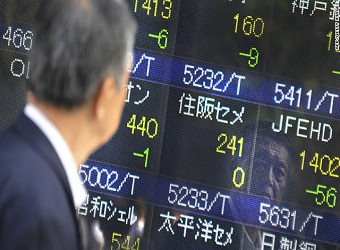Stock markets in Asia closed Tuesday mixed after cautious trade after stocks stumbled and investors turned to safe haven assets on the back of North Korea’s recent nuclear test.
The Nikkei 225 fell 0.63 percent, or 122.44 points, to end at 19,385.81.
South Korea’s benchmark Kospi index reversed slight gains made earlier, slipping 0.13 percent to finish the session at 2,326.62, after closing lower by more than 1 percent in the previous session.
Down Under, the S&P/ASX 200 closed moderately higher, edging up 0.07 percent to end at 5,706, with falls in the utilities sub-index offset by gains in gold stocks.
Hong Kong’s Hang Seng Index slid 0.05 percent by 3:11 p.m. HK/SIN after trading higher for most of the session. Mainland stocks were resilient: The Shanghai Composite gained 0.16 percent, or 5.5463 points, to close at 3,385.1293 and the Shenzhen Composite inched higher by 0.204 percent, or 4.0163 points, to end at 1,972.1382.
Tensions on the Korean Peninsula remained in focus after South Korean media reported on Tuesday that North Korea was transporting what could be an intercontinental ballistic missile (ICBM).
The U.S. on Monday called for the “strongest possible” sanctions to be imposed on North Korea a day after the North said it had tested a hydrogen bomb. President Donald Trump also spoke to South Korean President Moon Jae-in on the phone, during which he gave “conceptual approval” for South Korea to purchase billions of dollars in weapons from the U.S., Reuters said.
Meanwhile, South Korea would proceed with the rolling out an anti-missile system that had drawn China’s ire, according to Reuters.
Gold prices were near their strongest levels in around 11 months, remaining supported by safe haven demand. Spot gold stood at $1,335.21 an ounce at 3:03 p.m. HK/SIN after touching as high as $1,337.98 earlier in the session.
Meanwhile, the yen — often regarded as a safe haven currency — firmed during the session, trading at 109.28 yen to the dollar compared to Monday’s close of 109.70 yen.
The Korean won clawed back some losses to trade at 1,129.46 won to the dollar after going as low as 1,132.61 won to the dollar overnight. The won had traded around the 1,120 handle at the end of last week.
Stocks in Europe and Asia had closed lower on Monday, with the Nikkei 225 falling 0.93 percent. The pan-European Stoxx 600 experienced more moderate losses, erasing 0.52 percent by the market close.
Despite the move to safety, analysts said market reaction had been relatively muted.
“Risk off sentiment has hardly become evident. Moves back to safe haven or risk-off currencies, [such as] the Japanese yen and the Swiss franc, have been very much at the margin,” National Australia Bank Director of Economics David de Garis said in a Tuesday morning note.
Positive economic data out of China failed to significantly lift sentiment in the region, although Chinese markets mostly traded higher.
China’s Caixin/Markit August services purchasing managers’ index (PMI) on Tuesday showed an increase to 52.7 from 51.5 in the previous month, Reuters reported. The August reading also showed the services sector in the country grew the fastest in three months. The official services reading came in at 53.4 in August — its lowest level since May 2016 — compared to the 54.5 seen in July.
Both Caixin and official manufacturing PMI for August released last week beat expectations, reflecting resilience in China’s manufacturing sector despite concerns of an economic slowdown.
Still, optimism over China’s economic outlook gave copper prices a boost on Tuesday, Reuters reported. Copper prices rose to a new three-year high after climbing as high as $6,946.50 a tonne earlier in the session.
On the energy front, U.S. crude added 0.55 percent to trade at $47.55 a barrel as demand picked up and U.S. refineries started to resume operations. Brent crude slid 0.11 percent to trade at $52.28 a barrel.
Gasoline futures fell 4.13 percent to $1.6757 a gallon, close to levels seen before Hurricane Harvey hit.
In individual stocks, Japanese automakers were mixed despite posting solid August sales figures in China. Toyota sales in the country rose 13.2 percent in August compared to a year ago, according to Nikkei Asian Review. Honda sales picked up 20.6 percent while Mazda sales climbed 8.4 percent, Nikkei said. In reaction, Toyota shares closed up 0.81 percent, Honda edged up 0.23 percent and Mazda fell 0.95 percent by the end of the session.
Meanwhile, South Korean retail names closed mostly lower. Shares of Lotte Shopping and Lotte Himart were down 1.24 percent and 4.53 percent, respectively. The moves came following news that Lotte Duty Free was weighing a decision to withdraw from Incheon International Airport in South Korea. South Korean retailers have had a difficult year owing in part to China’s opposition to the deployment of an anti-missile system in South Korea.
In economic news, the Reserve Bank of Australia left the cash rate unchanged at 1.5 percent on Tuesday, as was widely expected.
The Australian dollar edged up to trade at $0.7972 at 3:08 p.m. HK/SIN, retracing losses made after the RBA’s announcement.
U.S. markets will re-open on Tuesday for trade after taking a break on Monday for Labor Day.
Source: CNBC


